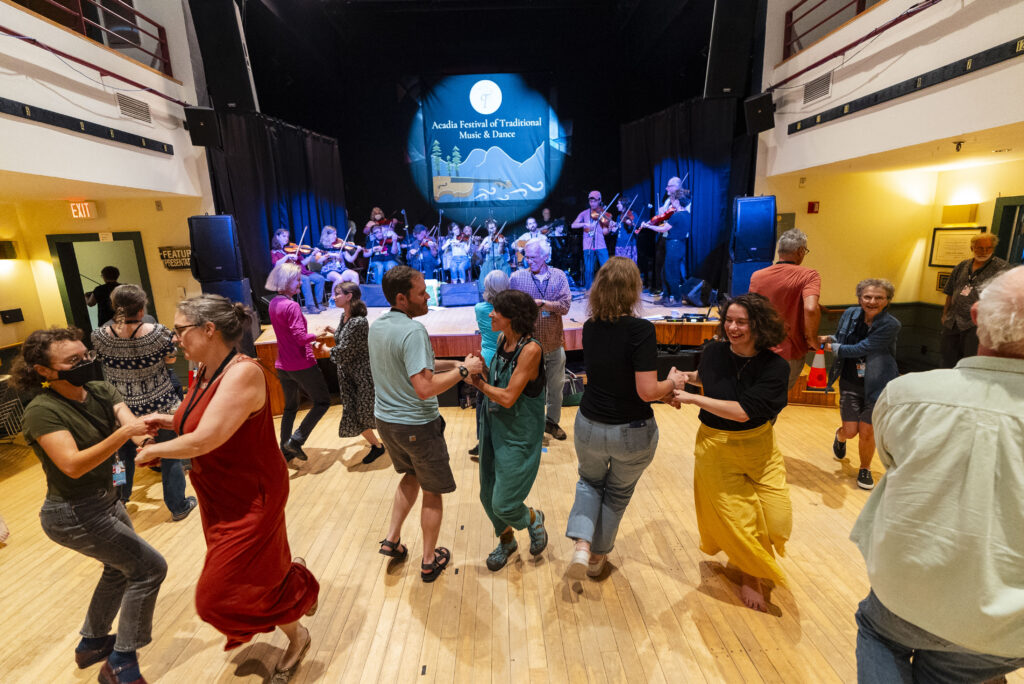About Us
tabbed subpages
Mission and History
Mission Statement
The Acadia Festival of Traditional Music & Dance is dedicated to promoting education and appreciation of traditional music and dance by producing a week-long summer festival composed of intensive classes, workshops, concerts, and dances. The festival’s goal is to build community, celebrate artists, and carry forward traditions using music and dance of Acadian, Cape Breton, Irish, Québécois, Scottish, and other origins to build bridges between generations and cultures.
A Brief History of Acadia Trad
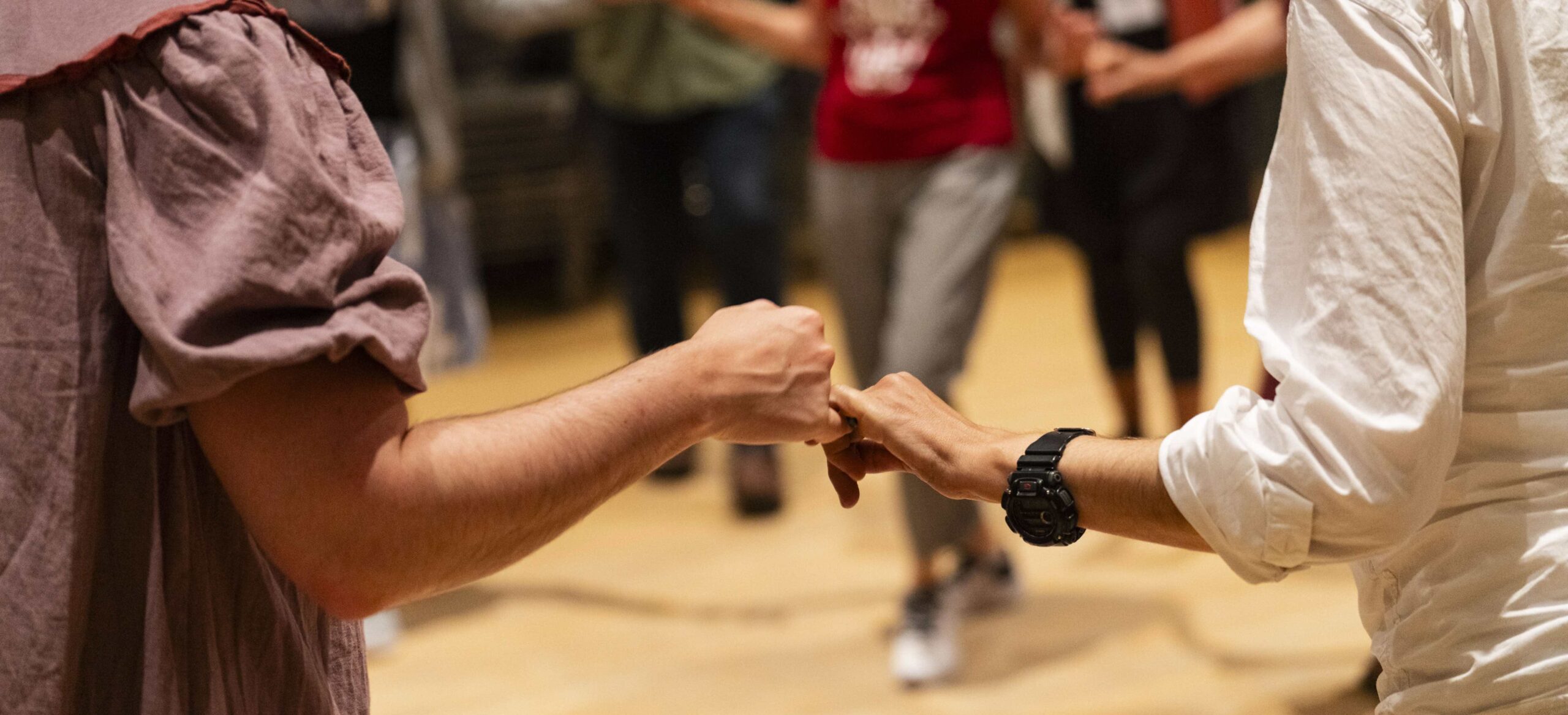
The Acadia Trad Festival was born of the idea that traditional music and dance strengthens our social fabric by building bridges that cross the divides of politics, religion, age, gender, race, and culture. These bridges create lasting bonds between people who otherwise might not ever interact. In 2011, Festival founder Chuck Donnelly linked up with members of the PEI Acadian band Vishtèn at a late night gathering after a gig in Maine. Fueled by BBQ sausage, beer, and good craic, ideas began to emerge of how to bring this idea to life. The following year, Donnelly reached out to Vishtèn to find out if they were still interested in helping launch this venture —the answer was unequivocal, “yes”.
Money was scarce, but the energy levels were high. With the foundational principles of focusing on several different styles of Celtic roots music traditions and getting the music and dance to as many people as possible, the first Acadia Trad Festival was held at College of the Atlantic in Bar Harbor, Maine in 2012. The festival enjoyed success and growth over the subsequent years. By 2017, the week-long Trad Festival hosted seven Celtic music styles, 11 public concerts in six venues, 120 full-time students, and 150 afternoon workshops – drawing international acclaim. In 2018, a new team led by Jennifer Torrance and Nancy Neff took the helm, continuing the Festival’s high standards of artistic excellence. Sadly, the entity voted to close in early 2020, and COVID-19 forced the cancellation of the festival scheduled for that summer.
In early 2021, a devoted group of past attendees and volunteers led by Dave Wasserman, Heather McAslan, Ellen Mahoney, Chuck Donnelly and Kerstin Gilg began brainstorming how to give new life to the Acadia Trad Festival. The group formed a working advisory committee and worked to professionalize the Festival by hiring a part-time year round staff and recruiting a world-class faculty that’s at least half new each year to ensure traditions evolve. In 2024, Friends of the Acadia Trad Festival gained 501(c)(3) nonprofit status. Remember – it’s not just the tunes, the dancing, the musicians or the traditions – it’s the magic that happens when we put it all together. Young artists learn from master tradition bearers, then bring their own unique gifts to the endeavor – thus the traditions are learned, celebrated and they evolve.
The traditions are alive.
Board and Lead Staff
Friends of the Acadia Trad Festival
Board of Trustees
David Wasserman, Chair
Shelley Keimach, Secretary
Kerstin Gilg, Treasurer
Emilie Carroll, Trustee at Large
Troy Jordan, Trustee at Large
Adam McLean, Trustee at Large
Sally Sommers-Smith, Trustee at Large
Chuck Donnelly, Trustee Emeritus
Lead Festival Staff
Festival Director: April Verch
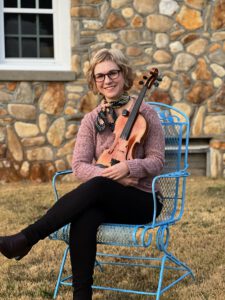
April Verch, a native of the Ottawa Valley in Ontario, Canada and now a resident of Onaga, KS, has been thrilling audiences around the world with her fiddling, step dancing, singing and composing for over two decades. In 2010 she was one of six Canadian fiddlers who represented the Canadian fiddle tradition to the world in the Opening Ceremonies of the Vancouver 2010 Olympic Winter Games. She’s released 14 albums, an instructional step dance DVD, a book of original fiddle tunes, and co-authored a method book on Canadian Fiddle Styles for Mel Bay Publications. She’s also a passionate and experienced educator at music camps, master classes and workshops.
Even now, after countless awards and nominations, Verch never forgets the roots of her music, that connection to the people out there in the audience or on the dance floor, to the community sparked by a good song.
“It’s about joining together to celebrate everyday life, through music. We’re all in this together.” And so she presses onward: diving deep into musical tradition, bringing people together and forging connections, and sharing her insight and genuine love for the music she plays so well.
“As a past faculty member, I know firsthand just how special this event was and is to our beloved music and dance community both near and far, young and ‘more experienced!’ I am thrilled to be part of this team, and excited for the opportunity to contribute to the redevelopment of a festival that plays such an important role in celebrating, preserving and evolving these invaluable traditions. I can’t wait to see you for that magical week in June! ”
Music Director: Mari Black
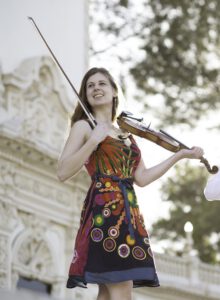
Called “one of the brightest fiddlers around today” (Brian O’Donovan, WGBH radio), multistyle violinist Mari Black’s passion for sharing joyous fiddling has led her around the globe in an effort to preserve and celebrate traditional music. Raised on a rich blend of traditional musical styles, Mari burst onto the international stage when she became Scotland’s Glenfiddich Fiddle Champion, 2-time U.S. National Scottish Fiddle Champion, and 2-time Canadian Maritime Fiddle Champion, all within a three-year period.Ever since then, she has been spreading her love for dance-based music, performing at Celtic festivals, celebrated folk venues, world music concert series, and acclaimed classical venues including Carnegie Hall. Mari’s ear-catching original compositions draw on a broad range of stylistic influences, and her two CD recordings – _Flight_ and _Unscripted_ – reflect her playful explorations through a diverse range of music: Celtic, Americana, jazz, klezmer, tango, and more.
Mari’s dedication to traditional music extends beyond the concert stage, as reflected in her work as a teacher, composer, dancer, competition judge, and musical ambassador committed to connecting people through music. She teaches regularly at prestigious camps and workshops around the country, and is committed to instilling passion, curiosity, and joy in her students of all ages. No matter where she’s playing, Mari’s favorite thing to do is sweep audiences away on a spirited musical adventure, celebrating tradition and exploring possibility in the dance-driven musics of the world!
“I have always felt the Acadia Trad School to be a beautiful and especially unique haven for making music, and I am thrilled to be a part of this outstanding new artistic team! This place speaks to my soul, with the powerful camaraderie present amongst students and faculty as we immerse in the traditional music we dearly love. The shared passion and joy of music-making that permeate our time together always recreate for me my very best early experiences as a young fiddler. To be able to carry on this tradition and vision now as a director is a dream come true, and the greatest honor for me. I’m already counting down the months until we’re all together again next summer! ”
Dance Director: Kieran Jordan
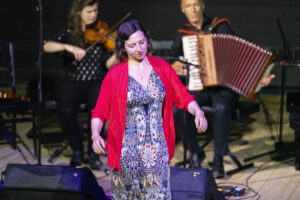
Kieran Jordan, based in Boston, is a performer, teacher, director, choreographer, and community leader in Irish dance. Regarded as “one of America’s premier dancers and instructors” (_Irish Echo_), she is known especially for her creative collaborations in _sean-nós_ and old-style step dancing. Her non-competitive Irish dance programs for adults have been inspiring students in these traditions for more than two decades.
Born in Philadelphia in an Irish American family, Kieran started Irish step dancing when she was just five years old. A passion for music and movement and a quest for wholeness, connection, and joyful self-expression have guided her unique career. With a performance style described as “playfully theatrical” (_The Boston Globe_) and “wonderfully expressive” (_The Living Tradition_), Kieran draws from contemporary dance, somatic practices, and more than 40 years of immersion in traditional Irish music and dance.
Kieran has an M.A. from the University of Limerick and a B.A. from Boston College. Winner of two Massachusetts Artist Fellowships, she also holds the TCRG certification for teaching Irish dance. With a deepening focus at the intersections of dance, movement, and healing arts, Kieran also practices energy healing, with certifications in Reiki and Polarity Therapy.
“It is my great pleasure to return to the Acadia Trad Festival, in the role of Dance Director! I look forward to working with the new leadership team to design a dance program that is varied, inclusive, inspiring, and engaging, for dancers at all levels. Can’t wait to experience the beauty and energy of this festival again — and let it weave its magic into my dancing and our community.”
Organizational note
Acadia Festival of Traditional Music & Dance is overseen by Friends of the Acadia Trad Festival, a 501(c)(3) Nonprofit Corporation. The Festival’s Board of Trustees is responsible for setting the mission, vision and student/attendee pricing of the Festival and hiring lead staff (including Festival Director, Administrative Director, Music Director and Dance Director). The Board of Trustees is responsible for setting the festival’s overall budget, with input from the Festival Director. In turn, the Festival Director, Music Director and Dance Director are responsible for selecting Festival faculty and curating artistic programming consistent with that vision and budget. The Festival Director reports to the Board of Trustees, with the Board Chair acting as liaison. The Festival Director, Administrative Director, Music Director and Dance Director do not have sole decision-making power over the Festival’s direction and do not have decision-making power in regards to the Festival’s overall budget.
DEI Statement
Our Commitment to Inclusion
The Acadia Festival of Traditional Music & Dance is committed to welcoming people of all backgrounds, including but not limited to: racial, ethnic, religious, sexual orientation, gender identity, disability, socioeconomic and musical.
The Festival acknowledges that it can be difficult for people from marginalized communities to feel welcome in traditional music spaces – whether due to a lack of racial diversity, gender binary language used in dances (expectations of female-male partners), financial status impacting access to instruments/musical tools/educational resources, or a history of oppression connected to the music learned and played – among many possible factors.
Among the ways the Festival plans to foster a welcoming climate for everyone are to hire faculty that include people of different racial, ethnic and cultural identities and backgrounds and artists who exemplify the voyages of musical styles over time; to hold gender-neutral dances; to avoid tunes that have an oppressive background in our teaching repertoire; to provide need-based scholarships and other financial assistance necessary to attend Trad School.
These are just a few of the ways we hope to make our spaces more inclusive, and the Festival is dedicated to continually evaluating how it can improve. If in need of support, please reach out to any staff member or the [Festival Director](mailto:director@acadiatrad.org “Festival Directors”).
Anti-Discrimination and Anti-Harassment Policy
The Acadia Festival of Traditional Music & Dance is committed to maintaining a community which recognizes and values the inherent worth and dignity of every person; fosters tolerance, sensitivity, understanding, and mutual respect among its members; and encourages each individual to strive to reach their own potential. We believe that there is strength in diversity which stimulates creativity, promotes the exchange of ideas, and enriches our lives.
Exclusion and harassment are antithetical to the creative process. Therefore, Acadia Trad does not and shall not discriminate on the basis of race, color, religion (creed), gender, gender identity and expression, physical appearance, body size, age, national origin (ancestry), disability, marital status, sexual orientation, or military status, in any of our activities or operations. These activities include, but are not limited to, employment practices, selection of volunteers and vendors, and provision of services including scholarships. In addition, our business practices will reflect the value of diversity.
We are committed to providing an inclusive and welcoming environment for all of our students, faculty, volunteers, subcontractors and vendors. Further, we are dedicated to providing a harassment-free educational experience and will not tolerate harassment of participants in any form.
Harassment includes offensive verbal comments related to gender, gender identity and expression, sexual orientation, disability, physical appearance, body size, race, religion, age, national origin (ancestry), disability, marital status, or military status in public spaces, deliberate intimidation, stalking, following, harassing photography or recording, sustained disruption of talks or other events, inappropriate physical contact, and unwelcome sexual attention. Participants asked to stop any harassing behavior are expected to comply immediately.
If a participant engages in harassing behavior, Festival staff may take any action they deem appropriate, including warning the offender or expulsion from the event with no refund. If you are being harassed, notice that someone else is being harassed, or have any other concerns, please contact a member of the staff immediately.
Acadia Festival of Traditional Music & Dance staff will be happy to help participants contact venue security or local law enforcement, provide escorts, or otherwise assist those experiencing harassment to feel safe for the duration of the event. Your attendance is valued. All participants are expected to follow these guidelines for the duration of the event including classes, workshops and event-related social activities.
Indigenous Land Acknowledgement
The Acadia Festival of Traditional Music & Dance is held in what is now called Maine, the unceded homeland of the peoples collectively known as the Wabanaki or “People of the Dawnland.” Today, the four federally-recognized tribes belonging to the Wabanaki Alliance are the Houlton Band of Maliseet Indians, the Passamaquoddy Tribe at Sipayik and Motahkokmikuk, the Aroostook Band of Micmacs and the Penobscot Indian Nation.
As we gather and celebrate traditional music and dance, we are grateful to be here, and acknowledge that we are doing so on the ancestral and unceded territory of the sovereign Wabanaki people that call this land home. We reaffirm our commitment and responsibility to improving relationships between sovereign nations and to improving our own understanding of local Indigenous peoples and their cultures.
Some actions we can take as we commit to uplifting and supporting First Nations peoples are:
1. To visit the [Abbe Museum](https://www.abbemuseum.org/) located in Bar Harbor.
2. To work to listen and bring Native voices to the forefront of land and sovereignty conversations.
3. To donate to Indigenous-led advocacy organizations. Here are Maine/Wabanaki groups we have been learning from:
Wabanaki REACH | Nibezun
First Light Learning Journey
Wabanaki Alliance
Passamaquoddy Peoples’ Knowledge Portal
4. To commit to continually learning about the history of and present-day issues faced by Indigenous communities and individuals.
Please take a moment to join us in reflecting and acknowledging the harms and mistakes of the past, which include exclusion and erasure of the very people whose land we gather on. May we each consider how we can try, in our own way, to move forward in a spirit of reconciliation and collaboration as we work to dismantle the ongoing legacies of settler colonialism and acknowledge the harms it continues to cause Indiginious populations. As you prepare to join us at Acadia Trad, you might enjoy reading about the cultural significance of the place we are gathering or listening to the voices of young Wabanaki artists discussing their work and their goals.
Thank you.
